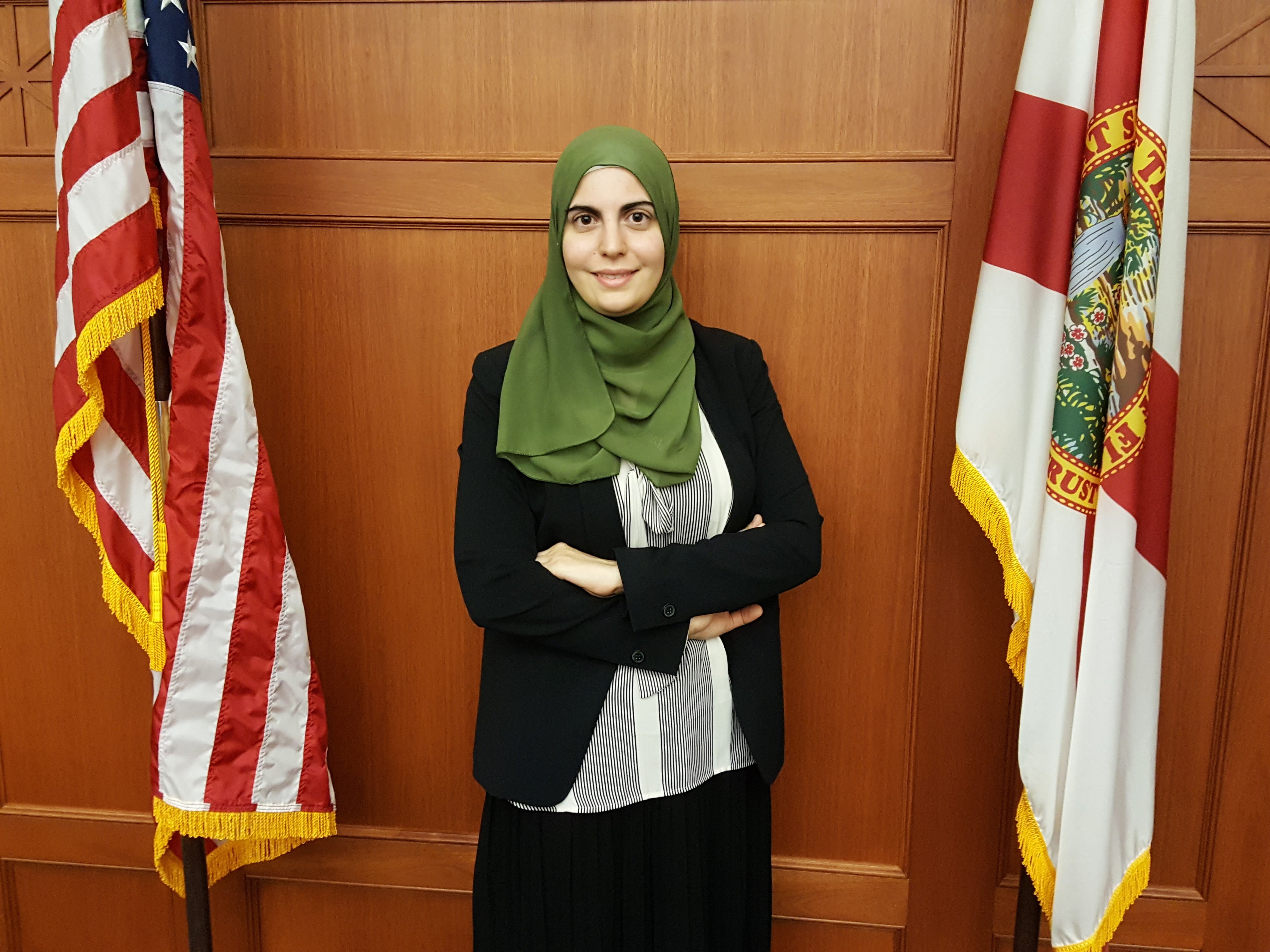Maryam Saleh: Exceptional Work Is Impossible Unless We Are Good People Too

Traditionally, each court hosting an induction ceremony for new attorneys asks the individual performing highest on the Bar exam to speak.
This spring, The Hon. Craig C. Villanti, chief judge of the Florida Second District Court of Appeal, invited Maryam Saleh, a recent Cooley Law School graduate and top Bar performer in the district, to speak on behalf of the attorneys being sworn in that day. The Second District covers 14 counties in five judicial circuits. There are five total District Courts of Appeal in Florida.
We are proud and honored of Maryam and her accomplishments. Below is her speech from May 9, 2016, along with video excerpts about her journey in life, in law school, and what drives her going forward.
Acting Chief Judge, your honors, may it please the court. My name is Maryam Saleh, and I am incredibly honored to stand before you today as a representative of the new class of lawyers being sworn into practice.
When Chief Judge Villanti called me and asked me to speak today, I was so excited I said yes without hesitation. A few days later, I realized what I had gotten myself into — I know they say lawyers love to talk, but I’d much rather make a compelling argument on paper than stand behind a podium and do it, so bear with me if I stumble through the next few minutes.
To my fellow new attorneys — congratulations on knowing enough about UCC-3 and limited partnerships to make it this far. Whether you have dreamt of practicing law your entire life or if becoming an attorney is just one step toward the fulfillment of a larger dream, today is the culmination of several years of hard work and dedication. And we should all be immensely proud of our accomplishments.
A few minutes ago, we made the following pledge: “I will never reject, from any consideration personal to myself, the cause of the defenseless or oppressed.”
This sentence is perhaps the truest embodiment of my journey to the law and my aspirations beyond it.
"And as we advocate for individual clients, we must also work toward the resolution of macro-level issues as well. We cannot hope to alleviate the suffering of marginalized communities without addressing the overarching problems that have contributed to their relative impotence. Even though it may be controversial or unpopular at times, let us take a definite stance on societal issues impacting the oppressed such as systemic racism, economic disparity, and what often amounts to the criminalization of homelessness and mental illness."
I mentioned earlier that my religious background is an influential factor in the reason I am a lawyer who firmly believes in advocating for justice for all, but especially for the downtrodden. In the Oath of Attorney, I see echoes of a teaching in my Islamic faith tradition that we ought to stand with both the oppressor and the oppressed. While it’s pretty obvious why we’re taught to support the oppressed, it may be less clear what it means to stand with the oppressor. We stand with the oppressor by preventing him from oppressing another person, by refusing to be silent when we witness oppression. As officers of the court, we can do this by addressing unethical practices we see from other attorneys, either by engaging in straightforward conversations with one another or reporting wrongful conduct to the Florida Bar, if the situation so requires. On the macro-level, we can prevent oppression by working toward larger causes to reduce political and social marginalization and exclusion — we should never be afraid to take a public stance on systemic practices we believe are harming a certain group of people. Large-scale oppression can only become obsolete if we challenge it collectively, and that is a shared responsibility we ought to take seriously. Let us pledge not only to stand up for the defenseless and oppressed, but also to hold each other accountable when it comes to acting on that promise.
I will leave you with the words of Dr. Martin Luther King Jr., a true revolutionary whose struggle for civil rights we often honor but whose values and ideas our society has yet to truly commit to. Dr. King once said, “The ultimate tragedy is not the oppression and cruelty by the bad people but the silence over that by the good people.”
"Now that we have officially joined the ranks of Florida’s legal community, let us go out and be exceptional attorneys, but we should remember that exceptional work is impossible unless we are good people too. Congratulations once again, and thank you."
